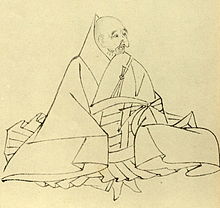Jien
Jien ( Japanese 慈 円 ; * May 17, 1155 ; † October 28, 1225 ) was a Japanese Buddhist monk, poet and historian.
Life
Jien was a son of Sesshō and Kampaku Fujiwara no Tadamichi , who held these highest offices for almost forty years, and thus belonged to the Kujō branch of the Fujiwara clan. After the death of his father, the ten-year-old became a novice in a Buddhist monastery and quickly rose to head the Buddhist Tendai-shu school in Japan.
In this position he had access to both the deposed Tennō Go-Toba and the Shogun Minamoto no Yoritomo , whom he met in 1195. Influenced by the disputes between Tennō and Shōgun in his time and his knowledge of the ongoing disputes between his father and his opponent Fujiwara no Yorinaga , which culminated in the Hōgen rebellion , he wrote the political-philosophical history work Gukanshō ( 愚 管 抄 , " Notes with a foolish brush ”or“ Excerpts from the limited insights of a foolish man ”).
In the work he represents, according to his opinion in history, effective destructive principles that led to a political "end time" and which one cannot escape but only counteract, especially since of the 100 predicted rulers of Japan with Juntoku already the 84th on the Throne sat. In particular, he saw in a renewed rule of his own Fujiwara family the chance of a renewed bloom along the lines of the rule of Fujiwara no Michinagas .
In addition, Jien emerged as the author of Musōki (" dream notes "), which went back to dreams from the years 1202 and 1216, interpreted by him as divine revelations, and he was also known as a poet.
swell
- John S. Brownlee: Political thought in Japanese historical writing: from Kojiki (712) to Tokushi Yoron (1712) , Wilfrid Laurier Univ. Press, 1991, ISBN 9780889209978 , pp. 92-93
- Nelly Naumann : Handbook of Oriental Studies: Japan. Religions. The Native Religion of Japan , Part 5, Volume 4, BRILL, 1994, ISBN 9789004101784 , pp. 2-7
- Klaus Kracht: Studies on the History of Thought in Japan from the 17th to the 19th Century , Otto Harrassowitz Verlag, 1986, ISBN 9783447024297 , p. 21
- Adrian Gerber: Community and Stand , Lucius & Lucius DE, 2005, ISBN 9783828202603 , p. 51
- Bruno Lewin : Japanese Chrestomathy : From the Nara Period to the Edo Period . Otto Harrassowitz, Wiesbaden 1965, 33: Gukanshô ( limited preview in Google book search [accessed on March 1, 2015]).
Individual evidence
- ↑ 慈 円 . In: デ ジ タ ル 版 日本人 名 大 辞典 + Plus at kotobank.jp. Kodansha, accessed December 1, 2011 (Japanese).
| personal data | |
|---|---|
| SURNAME | Jien |
| ALTERNATIVE NAMES | 慈 円 (Japanese) |
| BRIEF DESCRIPTION | Japanese Buddhist monk, poet, and historian |
| DATE OF BIRTH | May 17, 1155 |
| DATE OF DEATH | October 28, 1225 |
